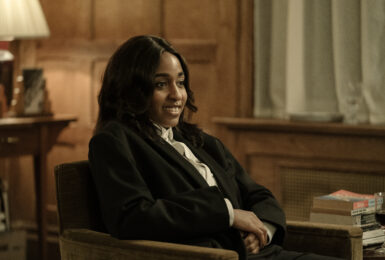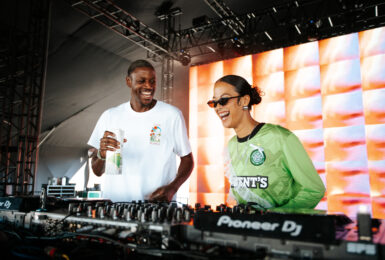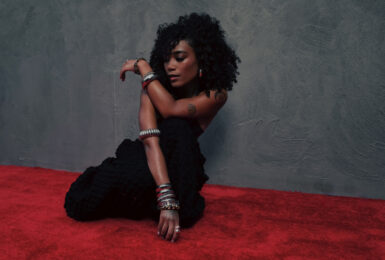
Music
bhm: the agony and ecstasy of a queer bad brains fan
I spent the 2017 AFROPUNK Festival in Brooklyn backstage interviewing the bands playing the Black Stage. The idea was to do a piece about punk bands keeping the festival true to its roots for the Afropunk.com site relaunch. Conversations were wide ranging — some were excited, other offered frank (and fair) criticism — but every single one circled around to the same essential truth: without Bad Brains, none of us would be here doing this right now.
By the time they laid down their first full length album, Bad Brains were already more legend than band. Four Black teenagers from Washington, D.C. — vocalist H.R. (Paul Hudson), guitarist Dr. Know (Gary Miller), bassist Darryl Jenifer, and drummer Earl Hudson — who applied the chops they’d honed playing jazz to punk rock, and almost single-handedly invented hardcore punk. Their rapid conversion to Rastafarianism integrated reggae and dub into their sound, inaugurating a musical curiosity and stylistic playfulness that remains tragically rare in hardcore music. Their iconic sound was topped off by a bombastic front-man whose lyrics interrogate the cracks in society and the cracks in his own psyche with equal fury, and whose stage presence was more combustion than performance.
By the time I was introduced to Bad Brains, the legend had far outpaced the band. H.R. had been on and off again for almost a decade. The band had cycled through members like Chuck Treece, Chuck Mosley, and Israel Joseph I, but were back together in their original lineup and touring under the name Soul Brains. I was going through a misguided straight-edge phase that had led me to an obsession with Dischord Records and the D.C. scene. In the depths of my Minor Threat fixation, the joy and life in Bad Brains’ music was revelatory. Then I started to read oblique references to “the Big Boys incident.”
It was the pre-Wikipedia Internet and I was a 17 year old punk baby who was failing badly at remaining in the closet. The scene was an often aggressively macho place, and for many people in my orbit, the rumors of Bad Brains’ homophobia was less a deal-breaker than part of the appeal. For me, ignoring it was just another lock on the closet door. The stories of “the Big Boys incident” were mythic themselves. So many versions floated around, who knows what to believe, and anyway, have you heard “Big Takeover?” That song slays.
As best as I’ve been able to piece together from all the sources I’ve encountered over the years, what happened is this:
Bad Brains were on tour in Austin, Texas playing a show with queercore pioneers the Big Boys in 82. After the show H.R. was thanking Big Boys singer Randy Biscuit Turner for putting it together, and Biscuit came out in the course of the conversation. H.R. for whatever reason took that as Biscuit making a move, and started spouting off. After he cooled down, H.R. asked Biscuit to procure a $40 bag of weed with the promise that he’d pay for it the next day. Both bands headed back to Big Boys guitarist Tim Kerr’s place to crash. The rest of the night was awkward, but uneventful.
The next morning, the guys from MDC (Millions of Dead Cops) came over and started it up again. This time it was an all out fight. Kerr had some queer art prominently displayed in his apartment, and the guys from Bad Brains felt uncomfortable about staying there. The tension exploded beyond H.R. and Biscuit. What was a misunderstanding the night before, turned into an all-out screaming match in the front yard, with everyone from Bad Brains (except Earl) shouting fire and brimstone, and MDC frontman Dave Dictor getting real racist about shit for good measure.
The fight was diffused before it got physical, but on the way out, H.R. handed Biscuit an envelope everyone assumed was full of cash for the weed. Instead it was a several page manifesto condemning queer culture ending with (depending on who you ask) “…may you burn in hell, the Bad Brains” or “Thanks for the herb, too bad about the money. Fire burn all bloodclot faggots!” or “Fire burn, Jah says the way you’re living, the lifestyle is not right.” For obvious reasons, Biscuit didn’t exactly save and frame the letter for posterity.
Though both bands preferred to downplay the incident, throughout the 80s, the story was embellished in all directions, from claims of H.R. committing physical violence against Biscuit, to Bad Brains’ shitty victim-blaming defense that Biscuit provoked it. Nevertheless, in 1989, the band recorded the vile gay bashing anthem “Don’t Blow Bubbles” on the otherwise excellent album, Quickness. Whatever the true details of what happened in Austin in ‘82, the fact is that by the time they recorded “Don’t Blow Bubbles,” H.R. was a grown-ass 33 year-old man. The “Big Boys incident” may have been provoked by youthful religious fervor and ignorance, but “Don’t Blow Bubbles” was a product of garden-variety, “mature” hatefulness.
So what’s a queer punk to do? It’s inevitable that in 2019 Internet-land, someone is going to link to this article with the text “Bad Brains is cancelled.” But what does that do for anyone? Cancelling Bad Brains is asceticism, not justice. Who does depriving oneself of some of the best hardcore — hell, best music — ever recorded benefit? Bassist Darryl Jennifer has recanted his homophobic younger days and seems to have made an earnest attempt to grow. That may be too little too late, but one of the first lessons you learn as a queer kid is how to love without having to forgive or forget. We are capable of loving our most problematic family members when they don’t love us back. We are capable of loving our punk fam too.
I’m not about to punish myself for H.R.’s decades-old homophobia, but I’m also not really able or willing to forgive it. To the best of my knowledge, he never made amends before Biscuit died in 2005. I gain nothing by denying myself the sense of liberation and exhilaration I feel when I blast “Destroy Babylon.” But I also can’t pretend that queer culture is almost certainly part of the societal excess the band was raging against in that song. It helps a little that “Don’t Blow Bubbles” ranks among the worst songs of Bad Brains’ classic era, but the skip button has only so much power. In the end, holding and owning that cognitive dissonance is the only option. Because it is the soul of punk to embrace conflict and not shy away from uncomfortable truths. It’s “I against I,” except here, both must survive: “I against I / Flesh of my flesh / And mind of my mind / Two of a kind but one won’t survive”
Get The Latest
Signup for the AFROPUNK newsletter




